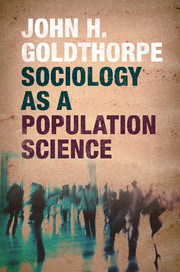Book contents
- Frontmatter
- Dedication
- Contents
- Acknowledgements
- Introduction
- 1 Sociology as a population science: the central idea
- 2 Individual variability in human social life
- 3 The individualistic paradigm
- 4 Population regularities as basic explananda
- 5 Statistics, concepts and the objects of sociological study
- 6 Statistics and methods of data collection
- 7 Statistics and methods of data analysis
- 8 The limits of statistics: causal explanation
- 9 Causal explanation through social mechanisms
- Conclusion
- References
- Index
4 - Population regularities as basic explananda
Published online by Cambridge University Press: 05 December 2015
- Frontmatter
- Dedication
- Contents
- Acknowledgements
- Introduction
- 1 Sociology as a population science: the central idea
- 2 Individual variability in human social life
- 3 The individualistic paradigm
- 4 Population regularities as basic explananda
- 5 Statistics, concepts and the objects of sociological study
- 6 Statistics and methods of data collection
- 7 Statistics and methods of data analysis
- 8 The limits of statistics: causal explanation
- 9 Causal explanation through social mechanisms
- Conclusion
- References
- Index
Summary
For sociology understood as a population science, the basic explananda are probabilistic population regularities rather than singular events or events that are grouped together under some rubric but without any adequate demonstration of the underlying regularities that would warrant such a grouping.
Elster (2007: 9) has argued that ‘The main task of the social sciences is to explain social phenomena’ and that ‘The basic type of explanandum is an event.’ From the standpoint of sociology as a population science, Elster's argument needs to be qualified in one important respect. The events with which sociology is concerned are ones of a certain kind: that is, events that can be shown to occur within a given population or subpopulation with some degree of regularity.
Most of the explananda, or ‘puzzles’, for sociology that Elster (2007: 1–5) suggests by way of illustrating his argument do in fact relate to regularities in events: for example, ‘Why are poor people less likely to emigrate?’ and ‘Why does an individual vote in elections when his or her vote is virtually certain to have no effect on the outcome?’ However, some further instances that he gives refer to singular events: for example, ‘Why did President Chirac call early elections in 1997, only to lose his majority in parliament?’ And, more importantly for present purposes, there are other authors (e.g. Brady, Collier and Seawright, 2006; Mahoney and Goertz, 2006; Mahoney and Larkin Terrie, 2008) who recognise more explicitly than Elster the distinction between regularities in events and singular events and who still maintain that the social sciences should be as much concerned with explaining the latter as the former.
To see why difficulties arise when distinctive, singular events, rather than regularities in events, are taken as sociological explana-nda, it is necessary to consider further the role of chance in social life. In this regard, a distinction between two different understandings, or usages, of ‘chance’ in a scientific context, which has been proposed by the biologist Jacques Monod (1970), is of value: that is, the distinction between ‘operational’ and ‘essential’ chance.
Monod observes that chance is invoked in an operational sense when, in dealing with certain phenomena, a probabilistic approach is, in practice, the only methodologically feasible one – even if, in principle, a deterministic approach might be applicable.
- Type
- Chapter
- Information
- Sociology as a Population Science , pp. 44 - 57Publisher: Cambridge University PressPrint publication year: 2015



